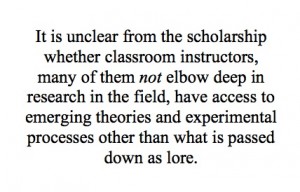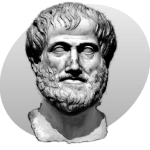The study of rhetoric can be traced back to Aristotle’s treatise Rhetoric, developed over several years in the 4th century BC. Wayne Booth notes that Aristotle’s inaugural work on rhetorical discourse first confirmed the multi-disciplinary application of rhetoric within education; it has “no specific territory or subject matter of its own,” but instead can be found everywhere (3). Now primarily living within the parent discipline of English Studies, rhetoric, and its marriage with composition as “the written branch of rhetoric,” is a field that has been historically fraught with a fight for legitimacy and for aligned and coherent methodologies (Lauer 20).
The core strategies of rhetorical discourse have lived through to today, despite its turbulent history throughout the ages. Critics often derided rhetoric for its emphasis on persuasion over truth, and indeed, Plato, transcribing Socrates’s attack on rhetorical oratory in Gorgias (380 BC) both somewhat defines the function of early rhetorical oratory but most pointedly condemns its moral and ethical uses in public speech. Francis Bacon defined rhetoric as “the application of reason to imagination for the better moving of the will. It is not solid reasoning of the kind science exhibits” (Booth 5). As scientific reasoning and knowledge blossomed in the Enlightenment, rhetorical studies and practice became a lesser area of study, regarded as artificial knowledge that is informed only by the work in other fields. John Locke, writing in 1690, reduced rhetoric to a deceptive art that promoted “wrong ideas,” and was performed by “perfect cheats,” whose only goal was to misdirect and misinform men (7). He allows that rhetorical arts are only effective because “men find pleasure to be deceived” (7). It is against this backdrop that we consider the standing of rhetoric and composition today in modern higher education institutions.
Modern first-year composition courses in American higher education institutions emerged at Harvard in 1885, after a long period of neglect in American higher education[1] (Bamberg 7). Scholars Sharon Crowley, James Berlin, and others who studied its entrance into colleges across the U.S. argue that its adoption was borne more from institutional goals to increase enrollments and reach new populations of students than from meeting specific learning goals (Skinnell 95). Thomas Miller observes that institutional imperatives drove much of the adoption of more pragmatic programmatic moves that “emerge at junctures where expanding disciplinary trends connect with social and technological shifts in literacy,” and where a focus on addressing the “literacy crisis” became an institutional duty (6). Due to a perceived lack of both rigor and clear and unified methodology, English studies, and composition studies in particular, was scorned from within the academy, because of its reputation of being “un-disciplined” (McComisky 10). With a renewed focus on first-year composition in the 1960’s, rhetoric and composition studies gained some ground because of accreditation requirements and its ability to “pay the bills” (19). Beyond simply addressing larger social and institutional needs, the early sixties ushered in new areas of study for composition scholars, as they considered the wealth of pedagogical literature, but lamented rhet/comp’s dearth of theoretical studies (Faigley 527). Theory became a legitimate research area in composition studies, especially theory that moved it beyond instruction in “grammar and usage” and into sound pedagogical processes (529). These early debates about the theory and practice underpinning rhetoric and composition studies have roiled at critical points throughout time, most notably in the seventies and eighties, [2] and bring us now to considering what remains as critical questions within the discipline.
Janice Lauer poses several concerns troubling modern day rhet/comp studies, pointing out that primary and secondary audiences serve two different functions within the field. She notes that the primary audience is scholars forwarding new theories and who have a rhetorical purpose; they are the “epistemic field of experts” (24). However, the secondary audience of writing instructors, who do not necessarily contribute new theory or research in the field, problematize current debates because “very little consensus can be attributed to” new claims in the field (24). This means that instructors are unified in teaching rhet/com, nor knowledgeable about the same composition theories, thus, are not acting as an epistemic body of experts who can determine value. Lauer further notes that there can be validation of discourse theory when new knowledge is widely adopted in the classroom, while other scholarly theories, however critical to the field, may disappear without much notice if they never influence instructional methods (24). This exchange between theorists and instructors is both beneficial to composition studies as we agree to processes and ideas that have merit, as well as potentially detrimental because some theory becomes gospel in writing instruction, despite the fallibility of its effect or truth.
 What’s compelling today about the continuing debate in rhetoric and composition, as well as English Studies as its parent discipline, is that, over time, little seems to have been resolved, but more conflict has arisen. These debates happen in the theoretical space, and thus, what gets adopted would be what gets more broad attention and becomes “lore,”[3] (Lauer 24, 26). It is unclear from the scholarship whether classroom instructors, many of them not elbow deep in research in the field, have access to emerging theories and experimental processes other than what is passed down as lore. Bamberg, studying the historical arguments against first-year composition,[4] presents the debate as having moved from external criticisms to internal issues, such as what gets taught (content) and how knowledge is transferred. More positively, studying the debates in composition as well as in English studies has brought about a new disciplinary focus, one that is based on historical analysis and comparative discourse that informs research and instruction today (Mclemee). And unlike English Studies, which continues to contest its position as an ever-alienated collection of language and communication fields, over time composition studies has enjoyed a more positive sense of community and aligned pedagogical goals (Lauer 27).
What’s compelling today about the continuing debate in rhetoric and composition, as well as English Studies as its parent discipline, is that, over time, little seems to have been resolved, but more conflict has arisen. These debates happen in the theoretical space, and thus, what gets adopted would be what gets more broad attention and becomes “lore,”[3] (Lauer 24, 26). It is unclear from the scholarship whether classroom instructors, many of them not elbow deep in research in the field, have access to emerging theories and experimental processes other than what is passed down as lore. Bamberg, studying the historical arguments against first-year composition,[4] presents the debate as having moved from external criticisms to internal issues, such as what gets taught (content) and how knowledge is transferred. More positively, studying the debates in composition as well as in English studies has brought about a new disciplinary focus, one that is based on historical analysis and comparative discourse that informs research and instruction today (Mclemee). And unlike English Studies, which continues to contest its position as an ever-alienated collection of language and communication fields, over time composition studies has enjoyed a more positive sense of community and aligned pedagogical goals (Lauer 27).
Works Cited:
Bamberg, Betty. “Alternative Models of First-Year Composition: Possibilities and Problems.” Writing Program Administrators, 21:1 (Fall 1997):
7-18. Print.
Booth, Wayne C. “How Many ‘Rhetorics’?” The Rhetoric of Rhetoric: The Quest for Effective Communication. Malden, MA: Blackwell, 2004. Print.
Faigley, Lester. “Competing Theories of Process: A Critique and a Proposal.” College English, 48.6 (October 1986): 527-542. Print.
Lauer, Janice M. “Composition Studies: Dappled Discipline.” Rhetoric Review, 3.1 (1984): 20-29. Print.
McComiskey, Bruce, Ed. “Introduction.” English Studies: An Introduction to the Discipline(s). Urbana, IL: National Council of Teachers of English, 2006. Print.
Mclemee, Scott. “Deconstructing Composition.” Chronicle Of Higher Education 49.28 (2003): A16. Academic Search Complete. Web. 27 Aug. 2014.
Miller, Thomas P. “Introduction.” The Evolution of College English: Literacy Studies from the Puritans to the Postmoderns, Pittsburgh: U. of
Pittsburgh Press, 2010. Print.
Skinnell, Ryan. “Harvard, Again: Considering Articulation and Accreditation in Rhetoric and Composition’s History.” Rhetoric Review, 33.2 (2014): 95-112. Print.
[1] There is growing debate about whether rhetoric truly suffered at the hands of the Romantics. See Christopher Diller’s article “The Art of Rhetoric: Aesthetics and Rhetoric in the American Renaissance, or Ryan Skinnell’s “Harvard, Again: Considering Articulation and Accreditation in Rhetoric and Composition’s History.”
[2] See Lester Faigley’s article “Competing Theories of Process: A Critique and a Proposal,” as well as Richard Fulkerson’s “Composition at the Turn of the Century,” for two comprehensive analyses of the theoretical debates in composition studies during the seventies and eighties.
[3] Mclemee defines “lore” as “a body of methods and rules of thumb passed down by generations of writing instructors.” See also Louise Wetherbee Phelps’s article “Practical Wisdom and the Geography of Knowledge in Composition,” (College English 53:8, Dec. 1991) and her discussion of practical wisdom and community sharing in composition studies.
[4] She references Sharon Crowley’s call to eliminate first-year composition in her 1991 Pretext article, as well as many responses to Crowley. Bamberg also cites Robert J. Connors as quoted by Charles Schuster as calling first-year composition the “Third World of English Studies” (8).


